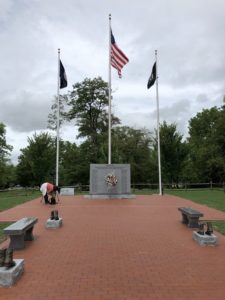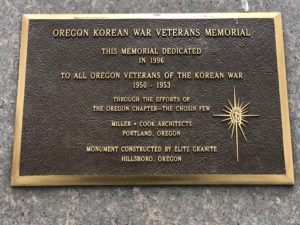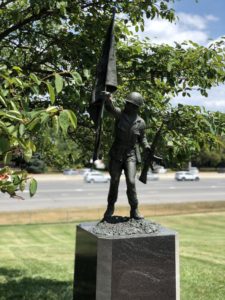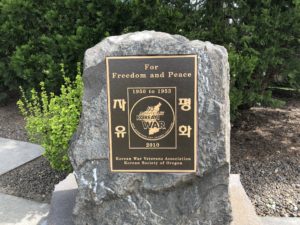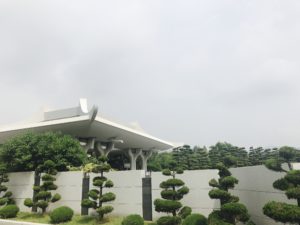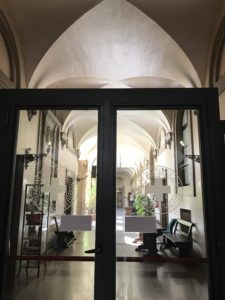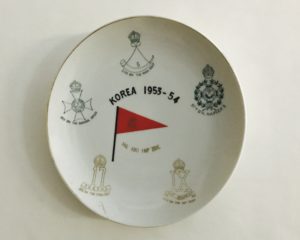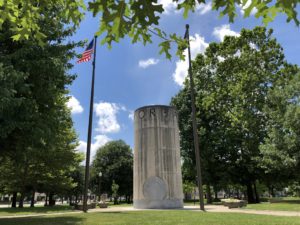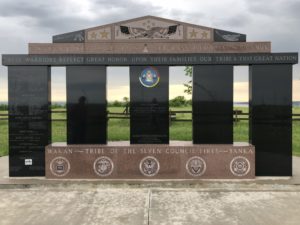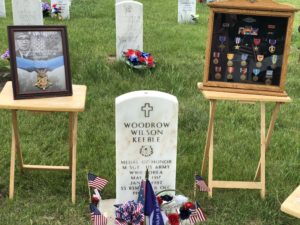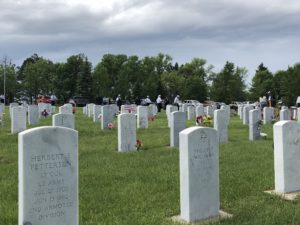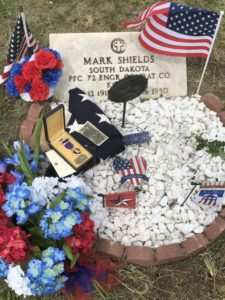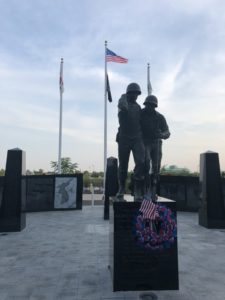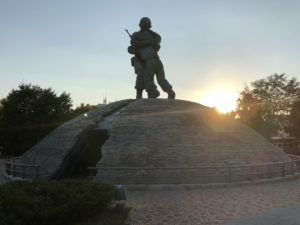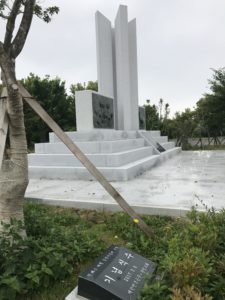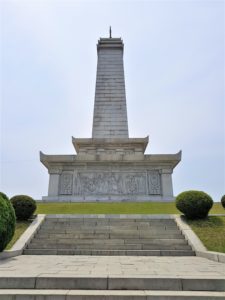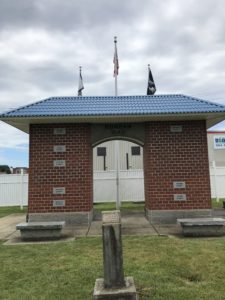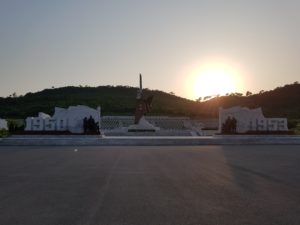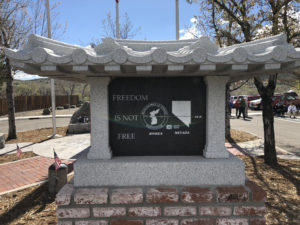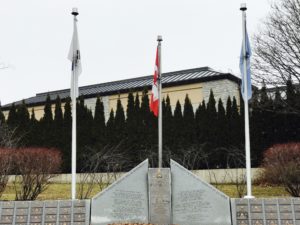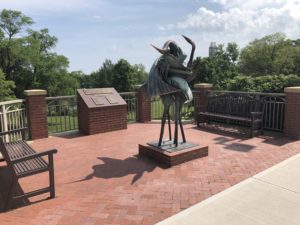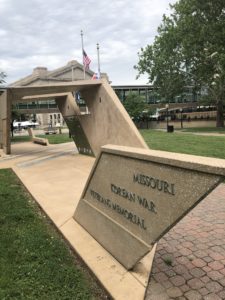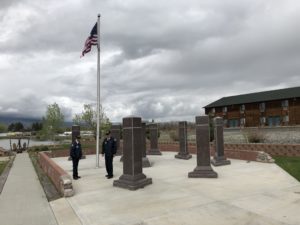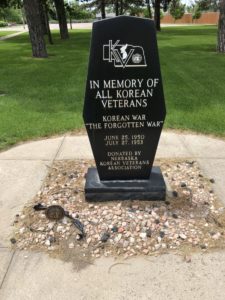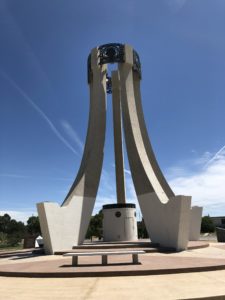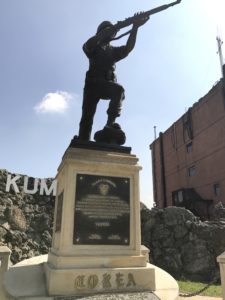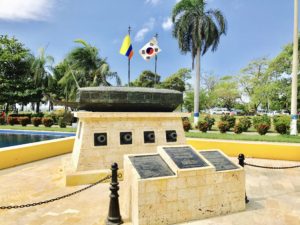>> [FOREIGN LANGUAGE].
>> So he’s the colonel lieutenant of the …
>> Claudio …
>> … Claudio …
>> … de Felici …
>> … de Felici …
>> [FOREIGN LANGUAGE].
>> … of the military corp …
>> Italian Red Cross.
>> … of the Italian Red Cross.
>> And we are in [FOREIGN LANGUAGE].
>> Okay. We are in the [INAUDIBLE].
>> [FOREIGN LANGUAGE].
>> We are in the room of the Red Cross where the personnel departed for the war in 1964.
>> [FOREIGN LANGUAGE].
>> October 16th, 1951.
>> [FOREIGN LANGUAGE].
>> So the hospital was operated from December 1951 to 1954 …
>> [FOREIGN LANGUAGE].
>> … and the personnel …
>> [FOREIGN LANGUAGE].
>> … were repatriated in …
>> [FOREIGN LANGUAGE].
>> … until the 10th of January …
>> [FOREIGN LANGUAGE].
>> … of 1955.
>> [FOREIGN LANGUAGE].
>> Mm-hmm. The hospital was composed of paramedics …
>> [FOREIGN LANGUAGE].
>> … medical officials …
>> [FOREIGN LANGUAGE].
>> … and …
>> Paramedic.
>> Paramedics, yeah.
>> [FOREIGN LANGUAGE].
>> Voluntary nurses …
>> [FOREIGN LANGUAGE].
>> … and Korean personnel …
>> [FOREIGN LANGUAGE].
>> … for the services …
>> Of the hospital.
>> … yeah, of the hospital.
>> [FOREIGN LANGUAGE].
>> The Korean authorities …
>> [FOREIGN LANGUAGE] the American authority.
>> … and the American authorities …
>> [FOREIGN LANGUAGE].
>> … of the …
>> [FOREIGN LANGUAGE].
>> … oh, of the coalition …
>> [FOREIGN LANGUAGE].
>> … oh, appreciated …
>> [FOREIGN LANGUAGE].
>> … the work …
>> [FOREIGN LANGUAGE].
>> … the work done by the Italian personnel …
>> [FOREIGN LANGUAGE].
>> … of hospital number 68, yeah.
>> Why was it called the hospital number 68?
>> I don’t remember.
>> [FOREIGN LANGUAGE].
>> Sixty-eight …
>> [FOREIGN LANGUAGE]. Now I don’t remember in this moment, but there is [FOREIGN LANGUAGE]. I don’t remember now because …
>> I’m very curious.
>> … this number.
>> I’m curious. I want to know, yeah.
>> [FOREIGN LANGUAGE].
>> Okay.
>> My name is Claudio de Felici. I am a lieutenant colonel of Italian Red Cross, and now we are in [INAUDIBLE] of headquarter of Italian Red Cross. [FOREIGN LANGUAGE].
>> How many people went to Korea?
>> One hundred people went to Korea to serve the fine hospital number 68 during the Korean War, and the hospital stayed in Korea from November 5 [FOREIGN LANGUAGE] 1951 to 1954 December. Italy went. They sent the hospital in Korea. Italy was not a part of the United Nation, but Italy is member wholly de NATO. Mamma mia.
>> My name is Steve Davidson. I fought in the Korean War. I was 19 when I was in Korea. I started off as an army cadet, I guess, when I was 13 years old. I drove a tank when I was 14, and I joined the Reserve Army, which is like being in the army. You could be called in case of war, and then the Armed Forces in Canada, you had to be 18, so I joined, and I went to Korea when I was 19, and I guess I was looking for adventure. So I got to Korea, and when I arrived to Korea, it was on the 3rd of January in 1953, and when I had seen the devastation that had been caused in the country, we stayed at a staging camp in Busan for a couple of days, and then there was a troopship or a train that went forward, and it took a couple of days for us to get to Seoul or Tokchon, actually, which was the railhead where they dropped off. From then on, it was Tokchon to the no-fire zone. Along the way, there were little children. We’d stop. Some of them had their arms blown off, their legs blown off. They had no clothes. They had nothing to eat. We would take them on the train. We would give them chocolate bars and leftover sandwiches and anything we could and give them one of our jackets if we could to help, much too large for them, but to help them keep warm. So when you’re 19, you look at it and you say, “Boy.” You become a man very quickly. So my job in Korea was, I was a gun technician, a gun fitter, they called it, and I repaired weapons and artillery weapons, so it was my job to make sure that the guns were firing properly, and they fired where they should be firing and that we could kill enemy targets. I recall a battle, 197. It was a very intense battle, and that’s when Canada lost 23 soldiers in 1 day. They had only arrived from Canada. I think the Chinese realized that they were new, and they put an attack in, and it was very intense. The artillery fire was very heavy, and one of the loaders on one of the guns, he missed the breech on the gun and hit the side of the breech ring and set off the fuse, and when he’d done that, he blew himself and the gun up. My job was to repair that gun, so I had to pick flesh parts off the gun from him. The parts were very damaged. It took us 32 hours straight to repair the gun and get it back into action again because in the war, you don’t rest until the job is done.
>> That’s true.
>> Yeah, no matter how long it takes.
>> Well, that …
>> I always say, these people who would like a 30-hour work week have no sympathy for me who paid 32 hours that one day. I’ve revisited Korea twice since then. The first time was in 1984, which was 30 years after the end of the war, 31 years to be exact, and I was amazed at the progress that South Korea had made to rebuild the country from the ruins. It was devastating to see it. When I got there, it was lively, moving very quickly and buildings with high skyscrapers again. When I was there, there was one bridge across. Now, I believe there’s probably a dozen, and I was really impressed. I was national president for the Korean Veteran’s Association. In 2003 for the 50th anniversary, I went to Korea with the [INAUDIBLE] to celebrate the 50th anniversary, and I was, again, amazed. When I was there the first time, I had the okay to attend the opening of the Olympic Stadium where Seoul was holding the Olympics in 1988, and they had finished the stadium by 1984, and I was at the opening of the stadium. I thought it was just wonderful. The second time I was there, they built a war museum. In front of the war museum, there’s a big, beautiful monument, and I was amazed once again at the progress that they had made. I guess in summing that up, I was a kid looking for excitement, something different. I didn’t really know why I was there. I’ve seen the Korea of today. I know why I was there, and I’m very happy, and I guess I consider all Koreans my extended family, and my closing remark I guess would be, if you’ve been in war for 1 day, you have had enough war to last a lifetime.
>> Can you repeat that?
>> If you have been in war for 1 day, you have seen enough to last you a lifetime.
>> I know. Thank you. We are so grateful to you, the Canadian-Korean War veterans and the Korean War veterans all around the world, and as you know, there’s still an armistice and South and North Korea remain divided, so what do you hope for the future of …
>> Well, I would like to see in my lifetime them united. I had a chance in my second visit to attend the memorial service in the demilitarized zone, and the South Korean pavilion is absolutely beautiful. On the North, you have a very long building, but it’s only 8 feet wide, but I’m 6-foot-2, so I wouldn’t have much room to lay down at night, and the South has progressed while the North has de-gressed, and people are suffering from malnutrition and wasting their money on developing weapons of destruction. That’s not the way the world should be.
>> Well, I hope that in your lifetime and our lifetime, very soon, that there will be peace, and we’ll be united so that even North Koreans who are suffering will also gain freedom that we, Koreans all over the world, enjoy so much. So on behalf of my family and friends and Koreans all over the world, thank you.
>> It’s been so nice to be able to meet you, and I think what you’re doing, traveling to every country that participated in the Korean War, is certainly a big undertaking for a little lady of your stature. You’re a good representative of your nationality.
>> I may be little, but I am strong.
>> You’re mighty.
>> I am mighty.
>> Yes. That’s right. You sure are. You’re beautiful.
>> Thank you so much.
>> Okay.
>> Love you. All right. You’re so sweet.
>> Thank you so much for the warm reception. This was beautiful. Today was beautiful.
>> We tried our best.
>> Best was better than any best, better than any best.
>> But all we can do is try our best. That’s what that … So It’s been a real pleasure to have you today.
>> Grandpa Dog, Grandpa Dave, Uncle Bill, everybody, thank you.
>> A lot of people.
>> I know why I was there. I’ve seen the Korea of today. I know why I was there, and I’m very happy, and I guess I consider all Koreans my extended family, and my closing remark I guess would be: If you have been in war for 1 day, you have had enough war to last a lifetime.
>> Can you repeat that?
>> If you have been in war for 1 day, you have seen enough to last you a lifetime.
>> I know. Thank you. We are so grateful to you, the Canadian Korean War veterans and the Korean War veterans all around the world, and as you know, there is still an armistice and South and North Korea remain divided, so what do you hope for the future of …
>> Well, I would like to see in my lifetime them united. I had a chance in my second visit to attend the memorial service in the demilitarized zone, and the South Korean pavilion is absolutely beautiful. On the North, you have a very long building, but it’s only 8 feet wide, but I’m 6-foot-2, so I wouldn’t have much room to lay down at night, and the South has progressed while the North has de-gressed, and people are suffering from malnutrition and wasting their money on developing weapons of destruction. That’s not the way the world should be.
>> Well, I hope that in your lifetime and in our lifetime, very soon, that there will be peace, and we’ll be united so even North Koreans who are suffering will also gain freedom that we Koreans all over the world enjoy so much. So on behalf of my family and friends and Koreans all over the world, thank you.
>> It’s been so nice to be able to meet you, and I think what you’re doing, traveling to every country that participated in the Korean War, is certainly a big undertaking for a little lady of your stature. You’re a good representative of your nationality.
>> I may be little, but I am strong.
>> You’re mighty.
>> I am mighty. Yeah.
>> That’s right. You sure are. You’re beautiful.
>> Thank you so much. Okay.
>> Love you. All right. You’re so sweet.
>> Thank you so much for the warm reception. This was beautiful. Today was beautiful.
>> We tried our best. I …
>> Grandpa Ken, when did you first go to Korea? When did you first go to Korea?
>> Why?
>> I have so much stuff.
>> Because I joined the Army to go there.
>> I have so much stuff [INAUDIBLE].
>> And when?
>> Right at the beginning of the war?
>> In 1950?
>> Yeah, in that time, in, around that time, yeah.
>> But you also fought in the World War II.
>> World War II, yeah.
>> So how old were you?
>> Sixteen and a half.
>> When you went to World War II?
>> When I to World War II, yeah. I was 16 years, 16 years old.
>> How old were you when you went to Korea? They recruited soldiers that young, when you were sixteen?
>> I guess I aged about 3 years or 4 years. I don’t know, but no. I went to Korea when I was … not Korea. I went … When I first joined the Army [INAUDIBLE] going right there. I lied like heck about my age.
>> You lied about your age?
>> Yeah. Well, see I told them I was 19.
>> Why did you want to join the Army when you were 16?
>> Sixteen, yeah.
>> You were a baby.
>> I told them I was 19, and I got in that way, and I was only 16, 16 1/2 when I got into action.
>> So when you went to Korea when you were I guess 19, 20?
>> I was about 16, yeah.
>> No, in Korea.
>> Wasn’t 16 when I went to Korea. Then I joined the Korean fun … The Korean war, I had already been in one war, and then that was my second war.
>> So how old were you?
>> Well, I started out, I was 16.
>> No, in Korea. How old were you when you were …
>> I would be about … Oh, I don’t know, 18, 19 if I was that old.
>> Okay.
>> I’m not sure of the age now. I forget everything. I do, and it’s a son of a gun. I can’t remember anything. Surely …
>> Well, you …
>> … [INAUDIBLE] stuff.
>> Well, what is your name?
>> So I spent time in World War II. Then when the Korean War broke out, I joined right up there with them.
>> What is your first … When you went to Korea, what was your first impression? What do you remember about the Korean War?
>> Korean War, well, going there and in a foreign land, foreign people to talk to and that, and it was just like anything else. You go, and you get used to it.
>> What do you remember from …
>> Well, I remember getting there and meeting other people and being ready for action, and I got wounded there, and when I back in the war again, I got wounded a second time, and nothing serious, but a wound was there. The first war I went to, I got everything, got all the paperwork done. I would sit there, and my mother said, “I’m going to have you withdrawn, tell them your age,” and I said, “Don’t bother. I’ll run away, and you won’t know where I am,” and that stopped her, so I went over there. I was in France, Belgium, Holland and all those places during World War II, and then when the Korean War broke out, I was there for that, and that’s it.
>> Have you been back to Korea?
>> I’ve never been back, no.
>> Yeah, you went back once.
>> Once, I guess, yeah.
>> Yeah, you were back once with me.
>> What year? When?
>> It was 2003, I think.
>> I forget what I was doing yesterday. I’m telling you. It’s tough.
>> We’re all getting older.
>> Yeah, damn right.
>> Getting older.
>> Oh, Jesus.
>> It’s okay. I forget too. Sometimes, I forget too.
>> I forget what I ate for dinner. You ask me what I had for lunch yesterday …
>> Exactly.
>> Hello. My name is Arthur Campbell. I went to Korea in February 1952. I left for Korea in February. I landed in Korea in March of 1952. It took us a month to get from our camp in Ottawa, Ontario. It took us a month to get over to Korea. They put us on a terrible ship. It must have been made in Japan or China back in the day because it broke down halfway across the ocean.
>> The ship broke down?
>> The ship broke down.
The big propeller stopped propelling, so thank God it had a little propeller on it, which kicked in, but consequently because we used the little propeller, it took us twice as long to get us across the ocean, which was not very nice. It was not very nice, but we made it. We landed in Japan. We stayed at the dry docks in Japan for about 3 days until they finished the ship. Then we went on to Korea. I liked Japan. It was very nice. It was occupied at the time, being so close to the Second World War. They didn’t know it was still occupied, and the occupation troops that were there were Australian, nice guys, big. They were all 6-foot-2, 6-foot-3, but they had the bad habit of thinking that the occupied Japan, that we weren’t allowed to touch anything. Excuse me. I won’t be vulgar, but we were all young guys, and we liked girls. So we would go to the dance hall.
You would buy a ticket, and the ticket would allow you to dance with a girl. We spent a lot of money on tickets. I did. Then, while you’re dancing, a big Australian would come along and say, “I’m cutting in,” and, “No, you’re not.” So we had a lot of arguments with the Australians, but we still had a girl. Then we moved on to Korea, and it was terrible. It was terrible. People were poor. The cities … It was awful. It was the most … I shouldn’t be doing this. I never went back. I had two or three chances to go back, but it just bothered me so much. I’m not over yet. When you were talking when you first come in, you were talking about … because of the troops that were there, United Nations, not just Canadians, United Nations, and because of them, you, your brothers, sisters, aunts, uncles are here now. That’s true. That’s very, very true because the amount of children, fatherless children, wonderful ladies that were just doing anything to keep their kids. It was terrible. So I’m proud. I’m happy about that, but I’m not going to get into anything as far as the terrible things that happened.
I can’t do it, and I won’t.
>> Then how about, so back here in Canada, you’re very active in the Association. What are some of the things that you’ve been doing as part of the Association to ensure that Canadians don’t forget?
>> What I have done, because I am the youngest, and thank God I’m still in fairly good physical condition, and I’m one of the few in the club. Now, Dave and I are both very good. Dave is an organizer. He can get things moving. Excuse me. I, on the other hand, am more of a hands-on type of guy. I can set up meetings. I can set up our picnics. I’m like a babysitter to most of the guys that can’t move, like I’m taking care of Ken. Ken and I are dear, dear friends. I pick him up, take him home. I take care of him. I’m sure you know that he has a little problem with dementia, and so yes.
What I do is humanitarian things, really. I love the guys. They love me. We get along together, and if I say to them, “Hey. We’re going to the Wall of Remembrance in July,” and this is January, “When?”, “19th of July,” “Okay.” They’re ready to go. I’ll make sure there’s transportation for them to and from and things like this. I’m not one to … I’m just one of the guys that can still help.
>> You’re the one behind the scenes that may move things.
>> I guess you could say that.
>> Yes, because there’s an organizer.
There’s a planner, but somebody has to do logistics.
You’re logistics.
>> Yep.
Yep.
>> Well, you said that it’s very painful for you to think about and remember it and even visit Korea because of the horrors that you’ve seen and witnessed in the war, but it is true that Korea still has not achieved peace. What do you think about that? What do you hope, maybe?
>> Well, I’ve heard that it does, so I’m terrified that that freaking idiot that they’ve got running North Korea, the little fat guy. All he talks about is bombs. I don’t like that. I don’t like him. We’re too old, but I’m telling you, if they need an instructor, there’s a lot of guys are capable. I’d go back in a blink of your eye. I would go back.
>> For to fight for Korea’s peace.
>> As an instructor. I couldn’t climb one mountain, not unless you got me a big billy goat that could carry me.
>> So you, as an instructor, you would leave your family even now to go back.
>> Right now, I have 13 grandchildren …
>> Wow.
>> … eight grandchildren, five great-grandchildren. My wife, God bless her, she passed away in 2008. She was a little girl, 4-foot-11, beautiful, beautiful, beautiful, Italian, black, black hair, brown, brown eyes, body … Oh. She was gorgeous, and then she had a stroke through diabetes. God, but thank God, she didn’t suffer. So to answer your question, I’ve got a family. I’ve got my kids, but they’re all grown up. They don’t need me anymore. They don’t need me anymore. They visit. They feed me. They phone, “How are you, Dad? Come on down Sunday,” which I do after church. I always drop in and see. But when the day comes that you’ve got no one that depends on you, really you’re taking up space. After my wife passed away, it was terrible. It was terrible, and yeah. I’d go back. I would go back. I’ve got too much involved in that country, too much of me. There’s too much of me still there. When I come home, yeah, I wasn’t the same Arthur that came home as the Arthur that went. Okay, sweetie?
>> I love you.
>> I love you, too, and you made everything … you and the thousands like you made it worthwhile.
>> Thank you.
>> Okay. Love that.
>> My name is Chester Brennan. I joined the [INAUDIBLE] went to Korea in 1951.
>> What do you most remember about it?
>> Lots of things about it, really. I remember riding the train from Busan up to near the 38th parallel. I remember it being hit by bullets, windows blowing out of it, and my first year was on Hill 355, and then, from what I understood, that my unit was at the point with the line going across Korea, and it was a very important position. If they got behind us, they got behind everybody, so we really worked hard to hold that position, and I was in a few real tough battles up there. We had an old post call back from [INAUDIBLE] that was it pretty hard during the day by the North Koreans, and I went over there at 3 o’clock in the afternoon and rescued three live guys, went back out and found three buried guys, and rescued them as well, all in the same afternoon, in broad daylight.
>> You have so many medals.
>> Yeah, it seems like every time I turn around, somebody is giving me another one, and I went from 31255, Hill 355, and I was moved from there over to a place called the Hook. I was on the Hook for 2 or 3 months, and I was in a couple major battles there, and then I moved to 187, and we had a terrible couple of battles there. We lost 40 of our boys in one night on 187.
>> And there’s a Korean War memorial, Wall of Remembrance, and I know there are names of those who were killed in Korea engraved.
>> I have them all listed on my briefcase, every one of them.
>> I saw that. I saw that, and you must recognize a lot of the names there.
>> I served behind the lines, where I knew all those guys. I was on 355. About 10 o’clock in the morning, we had a guy on the stretcher by the name of Bradshaw. We had a [INAUDIBLE] on the front, and the corporal, he was on the front, a lance corporal on the back and me on the back, and a shell hit the [INAUDIBLE] and killed three of them. I got blackened but didn’t get hurt, so somebody was looking after me, I guess. I don’t know.
>> Well, I’m sure God was looking out for you, and you see the names on the walls, and they all died, but you see South Korea, the prosperous nation that she is, and Koreans all over the world know, whether Korean Canadians, Korean Americans, like me, we’re so grateful. What do you feel when you see that?
>> See?
>> Korea, Koreans, what do you feel?
>> Well, I was there, and it brings back memories, brings back memories of what I did, what I went through. I’ve been decorated several times by the presidents of Korea. I did that big [INAUDIBLE] the big stone downtown [INAUDIBLE], and I went to … They called me to a big special meeting in Toronto with Korean people. They decorated me with that, and it really … It’s something else, really.
>> What do you hope for the future of the Korean people, or …
>> I hope they don’t go through it again. When I was there, there was nothing for them. Seoul is not the Seoul that I went through there, and there was kids with no clothes. People come along and beg you for something, to give them a pair of socks or something, and they were … They had nothing that they needed. They needed clothes, and it was a very sad situation. The only highlight I got at all, there was a little boy, we called him Willy, RCR Willy, and I was with him when he was just smaller than him, and he came to Canada with me, and he’s in Canada now. RCR Willy is what his name is. He’s in Canada, and he was just a little guy, and we rescued him. He was all by himself and nobody to take care of him, so we took him with us, and he’s in, I think, he’s in Ottawa here, a little Ottawan [INAUDIBLE] RCR Willy.
>> How did you guys meet again?
>> We just happened to run into each other, and I just got talking. When I heard his name, I said, “Kid, are you RCR Willy?” “Yeah.” He said, “I know you.” “Yeah, I know you, too.” We rescued him. We named RCR Willy because I was RCR, Royal Canadian Regiment, we named him RCR Willy. He’s in Canada somewhere now, in Ottawa somewhere.
>> And he kept his name?
>> What?
>> He kept his name Willy?
>> RCR Willy.
>> Wow.
>> Yeah, he’s in Ottawa somewhere.
>> That must have been very emotional.
>> What?
>> That must have been very emotional.
>> Oh, yeah, yeah, he was quite a little guy.
>> Well, I can guarantee you there are many, many Koreans all over the world enjoying the freedoms and success that we are thanks to your sacrifices.
>> Mm-hmm.
>> Thank you.
>> Yeah.
>> My name is Michael Bladen, and I went to Korea with the Royal Canadian Navy. I was there from 1954 until 1955, and basically, our job was to patrol up and down the coast to make sure that nothing was going, nobody was intruding on ROK land or sea area, and one of our major things that we did was to take clothing and provisions to the islands that were isolated by the Korean War. So that was a large part of what we did, and we used to darken ship and patrol every night, and essentially during the day, we were there 2 weeks at a time, and then 2 weeks we would go into rehab in Hong Kong or Japan, any one of those places, and then back in for 2 more weeks, so it was each time. And then that essentially was what our job was.
>> So you’re telling me that you were in Korea after the armistice?
>> After the armistice, that’s correct.
>> Not a lot of …
>> They were still fighting in early part of the ’54 though.
>> Not a lot of people know that.
>> Not a great deal, but it was sort of back-and-forth skirmishes but …
>> December 1952 is when I found out I was going to Korea, so New Year’s Day, I pulled out of Canada to go to Korea [INAUDIBLE]. So we’ll skip all that stuff. We’ve been over that. Anyways, when I was there, my job was sample. [INAUDIBLE] for their CHA. My job was to fix the line from the TAC headquarters to the OP, observation post, 6-5 and 7-5 OP. We used to have to go through this road that they had. It was a camouflaged road. Most people call it that. I call it Whizbang Alley because every time a shell landed there, all you hear is the whizzing of shrapnel flying all over the place, and the Chinese had a different tactic. Most artilleries, like have been in two wars, most artilleries have a nice pattern when they drop their shells and when their guns fire over. The Chinese didn’t. They’re always [INAUDIBLE] all over the place, so after a while, you get used to their idea. You know there’s going to be four rounds coming in somewhere. You don’t know where but somewhere, and this one time, they fooled us. They only had three, so we waited for the longest time to see when the fourth one is going to come in, so being in the artillery, you know that they always had four [INAUDIBLE]. So that’s fine and dandy. So we found out the next day they only had three, and the day after we found we had four [INAUDIBLE]. Two days before the attack of 187, we were going through this camouflaged road, what I called Whizbang Alley, and four rounds come in at exactly a perfect pattern. Don’t get me wrong. The Chinese are deadly on their computer. They have mortars that are really good, but anyway, they’re deadly, and we couldn’t figure this out because other than that, they’re all over the place. In fact, they give the false information or false feeling that they couldn’t hit the boards out of a barn door if they’re standing on it. That’s the way we felt like, but we know better after, so the day of the attack, we moved into one place. Oh, pardon me. The lines were out on the [INAUDIBLE] thing there, and our job is to fix these telephone lines and [INAUDIBLE]. I was fixing [INAUDIBLE] on the line. That’s when we found out some of the flairs were going up at night, and you took a pink sky, everything, pink sky, so we watched that, and one of the guys from the infantry told us, “We want you in this trench over here,” so we went over to that trench there. So we went in that trench area artillery [INAUDIBLE]. When I joined the artillery, I was supposed to be behind the lines, not in front of the lines. I ended up on the front lines. I don’t know how, but anyway, just like anything else I do in my life, it’s always backwards, but anyway, we were on the front lines. Now all I can tell you is what I seen and what I did, and most of the time I forgot, and I can’t remember what it is myself, and I really couldn’t care less. That’s the way I feel about it. There was an attack. The first shock is when I first seen my first enemy. It’s kind of a shock. Even though I was trained for it, it’s still there, but I caught myself into that time, fine and dandy. That was the first shock. After firing, I took that kind of … It looked like a wall of Chinese coming at you after the first shock of this trench and put that wall out [INAUDIBLE] they would wall back up again because they come in hordes. The next shock I had, I kind of had good therapy [INAUDIBLE] and they asked me different things what you might see over there, and one thing I brought out, I says, “With all the noise going on, the machine guns going and firing bombs and all other kind of stuff going on, the loudest noise you ever have is the click of a rifle when it’s empty.” So now, they’ve got a brand-new soldier. Anyway, that was the first time I got the first sign of fear go right through my body, but once again, you’re trained. I went down. There’s enough ammunition on this [INAUDIBLE]. I reloaded, fired. Okay, second time that happened, I knew what to do. I was okay, but that was the first two shocks I had, scared me was the first enemy I’ve ever seen, the first time I run out of ammo and stuff like that. What happened after that, I couldn’t tell you. All I know after a while, we run out of ammo, and I was on top of the trench until somebody had me by the leg and said, “Get back in the trench again,” so I got back in the trench again. Lucky thing I did because our machine gun behind us opened fire and cleaned house for us. So I got back in the trench, fine and dandy. So 2 days later, we had another line crew come up and relieve us to go for a shower. So anyway, shouldn’t do that. Anyway, we went for a shower, and that’s the time when I come across … I didn’t I had it. I didn’t feel it. I had bruises on my arm and bruises on my leg. I don’t know where it come from, how it got there, didn’t have a clue. So after the shower, we come back, and we’re told we were not going back on the front line. We were going back to the regiment [INAUDIBLE]. So I got back there, and I went on [INAUDIBLE] and told them about my bruises. They asked if I was drunk or what I was drinking to get these bruises, and I says, “I never had a drop of liquor in my mouth for 2 weeks or 3 weeks.” Nobody gets that many bruises and he’s sober, so I tried to explain that we were in the middle of a battle, so what happened there, I couldn’t tell you, so that’s about all, nothing much. You’ve probably heard that story 1,000 times, so there’s nothing much to it. That’s all I can tell you.
>> What do you wish for the Korean people and the current future of Korea?
>> I’m going to tell you something that I tell everybody, and a lot of other Korean veterans agree the same. They always classify us as heroes.
>> I’m so sorry. I’m so sorry. Can we be quiet a little bit? Sorry.
>> They always classify us for being heroes, going halfway across the world and doing war. Our heroes, what I see that are heroes is the ROK Army. They fought all 3 years in that battle. They come home and rebuild the country from dirt up, and there you go. That’s my hero.
>> Well, you’re my hero.
>> Sorry. I’m sorry. I shouldn’t do this.
>> Thank you so much.
>> I’m sorry.
>> I’m sorry.
>> I’m sorry. I don’t know why, but I should never do this.
>> I would think that they are tears of joy and pride because what you have sacrificed for … Look at us.
>> Yeah, well …
>> Now look at us. Look at me. Look at my friend. Look at Koreans all over the world. We’re enjoying freedom today. You should be proud.
>> Well, after 65 years, you think it should be nothing near, but every so often it hits me. I don’t know why and no reason for it to me, but that’s it. So sorry.
>> Grandpa, done?
>> Yep.
>> I love you. Thank you.
>> Yep, yep.
>> My name is Duncan Finney, and I spent 14 months in Korea. I was attached to the Signal Corps. I was in Sig Corps attached the 81st Field Regiment, and I ride in Korea in ’52 and came home shortly after the ceasefire. I’ve been very involved in the Korean Veterans Association and have been back to Korea a few times, and I’m amazed at how much the country has progressed and how it looked the last I was back in 2013 and feel very proud for you people, for you have accomplished so much.
>> Well, what do you want younger Canadians and young generations of Koreans all around the world, what do you want them to remember of this war? How do you want them to remember this war and the Korean War veterans?
>> Well, I guess same as my own children. They know about the war, and they are grateful that Canada participated in the help of South Korea, and I’m sure your children will do the same too, and they should have that privilege and not have that dividing line between South and North.
>> Now you took me to the memorial earlier and showed me the names of your comrades who never made it back home.
>> Yes.
>> And I know the association, many of the grandpas worked hard to get that memorial built.
>> Yeah.
>> What do you feel when you go there?
>> Well, I know about the fact that we lost 516 guys, and our association has been very strong in letting the families know that we support them and let the government of Canada understand that when we put that wall up, because we really didn’t get any assistance from the government at all, and Bill Allen was the one that spearheaded this, and Dave was on the committee, seven or eight guys who formed the committee, and they did a darn good job, and we have had a number of dignitaries from the Canadian government. They’re proud to go there and see it, and they know what we accomplished. When I was there in ’52, there wasn’t much there and how much the country has progressed, unbelievable. It makes you happy to think that you were a part of it.
>> Well, I can tell you that not only the country of Korea but the people of Korea and Koreans all over the world, including me, and that’s why I’m here today, and my friends and family, are all grateful to you. Thank you.
>> Thank you. It was a pleasure. Maybe some day our paths will cross again.
>> Oh.
>> I’m going to go to Korea some day, but you’re living in the States now, in LA?
>> In Washington DC.
>> Oh, Washington, I haven’t been down there for a while, but I did see the monument they have down there.
>> It’s beautiful.
>> We have more of an augment. It’s a duplicate of one that they have in Korea. All right.
>> Well, thank you so …
>> My name is Victor Fini. I served in Korea. I went over in 1952. I was there from 1952 to 1953. I was there approximately 14 months. I was a replacement from a first battalion, and I landed in Busan. That’s the first place we landed in, and before I got there, we sailed from Seattle, Washington, and that’s where we landed, in Busan. And then from Busan, we went up to the front at that time. We went up in freight cars. [INAUDIBLE] when I went over there, I was in advance party, which was 65 [INAUDIBLE] it was very rough going over there early. An awful lot of them got seasick from the water. The ocean was just up and down, like a bubble. And we went up, up in the front, we were up there for about 2 months, and then the rainy season started. And when the rainy season started, we moved. That’s when we moved back to Incheon for approximately 2 weeks. Then after the 2 weeks, then we went back up to the front again, and from then, I was up there until September of 19 … in ’52, and then I a transferred to transport, and then in transport, I was … My job was, at that time, was driving a cadre around, and we had to go up to the front every so many days to see if there was … How the troops were doing and which I’d lose someone while I was up there. And whatever else you want to know, I lived in it. For what we had to live in there at that time, I always kid people and say it was like a motel, but what it is is a square hole in the ground, 6-by-6, and there was an awful lot of rats in that part of the country at that time, and also, I seen where we was, and when we had to go up there, the roads were very dusty, and they would see you, enemy would see you coming, and they would try to knock you off with … They see the dust, and then they try the mortar and see if they can they can knock you off. By the grace of God, I was always safe, and that’s my interview.
>> By the grace of God, you were protected, but thanks to you, here I am.
>> Thank you.
>> Excuse me. My name is Bill Pavel. I was in the Korean War 1953 to ’54. I joined the 3rd Battalion, Royal Canadian Regiment, airborne regiment, although they weren’t used over there, and I was approximately 19 years old when I went over. I joined up in Toronto, took my basic training in Petawawa. That’s Northern Ontario, and once you become a Private First Class, then you qualify to go overseas into a combat zone, but you must have so many months of training, you know, in hand grenades, rifles, grain guns, et cetera, before they send you. You don’t just join up and 3 days later, they ship you out. It doesn’t work that way. You have to go through this basic training, they call it. It’s the same as most armies. There’s a basic-training period where you experience … You get behind tanks. Tanks are firing all the time, and I was in the infantry, and you follow them, and you root up gullies and dig a slit trench, and you get trained. You never get really enough training because once you get to the front line and the actual circumstances, everything changes, but it does help. Where I had one advantage, not only me but most guys from down from the maritimes, you were never far from the woods. When I was 15 years old, I bought my first .22, and I lived in the woods, shooting rabbits, stuff like that, and I was also in the Sea Cadets and the Air Cadets, and I learned map reading and how to use a compass even at that young age, so I guess what I’m trying to say is, when I went to the Army, I had a lot of advantages that other people didn’t have. And I’ll give you one example. When I joined up, we went to Petawawa, and I laugh when I say this, but we all got together, a platoon of 32 people, soldiers, and the sergeant said, “Okay, everybody build a fire.” Simple little thing, build a fire, so I go in the woods, grab all the dead twigs, break them all up, start my fire, no problem. Probably 10 minutes, smoke coming up, and these city slickers, I used to call them, they had green branches with green leaves on it, and they’re trying to light it, you know? So what I’m trying to say is, coming from Nova Scotia, like an area like that where you’re more or less brought up in the woods because my uncles and cousins, they went into the bush, and I’d see them coming home, and you’d have thought they were John Wayne. They all had a shotgun and a bullet belt on. You kind of looked up to them. As soon as you got to that age, you did the same thing and followed suit, so that was a big advantage for me when I was in the Army, very big advantage. And why I got in, like I say, I was hitchhiking across the country 2 years in a row, ’50, ’51. The war had broken out in 1950. I think it was June, and I thought about it, you know, but after hitchhiking 2 years, I worked on ranch in Alberta, for example. I wasn’t going anywhere, seeing the country, of course, getting a little bit of an education, but one day, we just got fed up, and we said, “Look, let’s go to Korea.” Never heard of Korea before, but we knew it was somewhere in the area of Japan and China, et cetera. So the call went out, and they got 26,000 volunteers, all volunteers, and, like I say, I went the last year of the war, very last year, 1953. And I joined with two or three guys, and one thing about the Army, it’s a very lonely place. You know, you always like to have a buddy, and I was lucky. One guy made the grade, and he came across with me, and because when you’re in the Army, even when you’re in a platoon with 32 guys, you only make maybe three or four real close friends. You do a lot of drinking, et cetera and stuff like that when you’re on the Army base, but as far as the whole battalion, which is about 1,200 people, you might know a few officers. That’s all, and so what I’m trying to say is, when you went to Korea, it was good to go with somebody that you knew quite well, had something in common, so that was kind of a break for me, and I joined up, and I’ll never forget, long as I live, but you see families that hug and kiss all the time that are real close. Well, we weren’t like that. We were kind of standoffish, and one thing that sticks in my mind is, when I got older and had children that got my age, they could’ve been going overseas, but when I went overseas, my mother was standing there. The door was here, and I was waving. I just said, “Good-bye, Mom,” and that always bothered me when I got older. At that time, it didn’t. It was just normal. We didn’t run over and hug, kiss and cry and all that stuff, but I often wonder how she felt when I’m walking out that door. That was hard to take later on, not then but later on. And I said, “Good-bye,” and we left. We didn’t have cell phones then. Might write her two letters a year from Korea, and now, the sounds, by the way, people contact each other. It’s kind of sickening to me because they walk out the door, and they’re on a cell phone, talking to their boyfriend or girlfriend or something. I don’t know who the heck it is, or they’re texting. So they often wonder what we were like. I probably wouldn’t have texted anything. There wasn’t a phone guy at the time either. So my mother had five children. My father died in 1935, so she had five kids, you imagine. It was in the Depression, and we were very, very poor. I didn’t think anybody was any poorer until I went to Korea, and then I see real poverty. It was just unbelievable. It’s unbelievable, and it was a real eye-opener for me that there was another world out there, and we were spoiled rotten, just like today even. The Western World is spoiled rotten. There’s people that … You can’t explain it. And so I left, and I went to …
>> What do you mean, they were so poor? Can you explain what you remember, how poor?
>> Well, we didn’t know. We never seen money. I never seen a …
>> You said in Korea.
>> I remember once, I got a nickel for a …
>> No, in Korea, you said that …
>> Oh, Korea was the most outstanding.
>> Can you describe?
>> Actually, it was in Japan where I’d seen it first. We were stationed in Japan, and we got there, and there was … The officers tried to tell us not to fraternize with the girls. There was too much VD, et cetera, and there was lots of it. But one day, I’m at the gates. The gate was locked. There’s a guard there. This mother was coming with her little child, oh, maybe 13, and enticing us to take the child into our home and have sex. You’d have to pay some money, but it wasn’t that much, and I’d seen that. It kind of gave me a jolt, and that wasn’t uncommon. That was a very common thing in Japan and in Korea, I didn’t experience that because I wasn’t around the population too much except once when I was in Pusan. I seen literally, say, this street here, goes straight down to the beach there, and there was just thousands and thousands of people just walking up and down. That’s all it was, and I had a camera with me.
>> You had a camera in 1953?
>> In ’53 because Japan was starting to make cameras and watches cheap. Japan had a very bad name then. They’ve changed, of course, they’ve progressed, but at that time, you could buy a camera, oh, maybe for $2 to $5, so I bought one. I think it cost me $10, and just me and my buddy were going up this street in … It was Incheon, not Pusan. It was Incheon, and he rolled out a stack out of tens, and he went like this. “I’ll give you $30, $40 for that camera,” and he went flip, flip, flip, and it looked like $40 to me, but I was still suspicious because he’d done it so fast. I took the camera off, and I gave it to him, and he gave me the money, and I didn’t want to let the camera go. I didn’t even look at it yet, so he got the camera, and he took off, and sure enough, there was one $10 bill there. The rest was paper. I don’t know how he’d done it yet. It was just amazing, but we got angry, so the next day, and this is hard to believe too. Next day, we’re on the same street, and I look up, oh, maybe 10 rows of people, and I see him again. He’s coming towards us, the guy is, so I said, “Here he comes. You stand there, and I’ll stand here, and we’ll grab him.” So we tried to grab him, and we couldn’t. He ran up the street and went into an alley, so we ran up the street into an alley, and in that alley was … It was like this, like a semicircle, and every house was a prostitute house. There were girls there, all young girls and everything.
>> In Korea?
>> Yeah, this is in Korea, yeah. They were all brothels, the whole bunch of them. But that didn’t bother us, and all of a sudden, out of the alley comes this guy with two other guys, and they both had a knife about that long, and they were coming. They’re not charging us, but they’re walking towards us, and so we backed out of there very diplomatically. We didn’t tackle them or nothing. We just took off, and that was my first introduction with people that were … That really couldn’t go any lower. And the word was that a family in Korea at the time, a fairly prosperous family, made about $300 a year, and we used to get our shoes shined by them. Little kids would be there shining shoes, and we’d give them $0.50 sometimes, and we’d use it quite frequently, and they’d do our laundry and everything. But at the time, I didn’t realize they were making good money. We thought it was just peanuts, but to them, I guess it must have been manna from heaven, which is unbelievable. So anyway, that was that part of it, and …
>> You went in 1953, right before the armistice was signed in 1953, July 27th.
>> Yes.
>> So how long did you stay in Korea?
>> How long?
>> How long did you stay in Korea?
>> Oh, I stayed in Korea. There was a great, big battle on Hill 187. The 3rd Battalion RCR fought that battle, and I was supposed to go on that draft, but I didn’t. I didn’t make it because I didn’t have enough training, so there, they had their battle. I think there was more people killed and captured in that battle than all the other battles in Korea, 187. However, they had to get reinforcements because they needed more troops, so what, they … When you’re a volunteer to go, they line you up in a place where … And they ask you. They say, “Bill Pavel, do you want to go to Korea, volunteer to go to Korea?” “That’s right. Yes, sir,” just like that. In other words, you just stay in line. Don’t step over, and you didn’t have to go, so everybody that went to Korea had the same question, “Do you want to go to Korea?” And you only had to say yes or no. I guess a lot said no, but the majority of them said yes. They went, and …
>> What did you expect? By 1953, didn’t you know that there were many, many who fought or died?
>> Oh, yes, yes.
>> And you still said yes?
>> So, yeah. The word was filtered back. “Hey, Charlie so-and-so was killed on Hill 187, RCR.”
>> Because I would think I wouldn’t want to go, seeing people that I knew or people from my country dying in a foreign land.
>> Well, you’ve got to understand Canada to know why. Canada was going to war since the World War. They went to World War I, and it was a slaughter. They went to World War II, and it was a slaughter, but all the generations probably looked up to their fathers and their uncles, like I had an uncle killed in World War I on December the 25th, 1914, just Christmastime, and it almost killed their parents. They never did get over it, but you got friends on your street that were in World War II. I remember, I was sorry I missed the World War II. I was just too young. Lot of guys lied to get there. They were 17 years old. They went, same with Korea, and you seen that thing I gave you about the first night? We landed in Korea, and after that battle, they had filled up the battalion. The battalion was way understaffed even to begin with, which is a tragedy, really. I didn’t know it at the time, but I know it now, that there was supposed to be 120, 25, 30 people in a company, and when I was over there, it was only 70, and then I found out later, later on, like I’m talking 40 years later, that even those guys that were in that battle, they only had about 75 or 80 people. In other words, they didn’t have enough people there, and I don’t know whose fault that was, but that’s the way it went. But when I went to Korea, we landed in Japan after 20 or 21 days on the ship, sailed from Seattle and landed in Yokohama, and we went through Kuri, the other side of Japan. Then we got on another ship to take us to Korea, and we landed at Pusan. So when you landed at Pusan, then you … First thing was the smell. As you’ll know, the Koreans used human excretion for fertilizer. We never experienced that before. You could smell that. Wasn’t too bad when you got on the front lines because you’re way up in the mountains, but all the way up in Korea, we’re on this train, very narrow train. It was a narrow, little bit narrower than ours. Every time the train would stop, it was a steam engine. It had to stop for water. There would be kids out there with their arms cut off, legs cut off, begging out the window, and we’d throw chocolate bars, et cetera, and stuff like that, and I started saying to myself, “What the hell is this?” And then again, the same thing happened. At that age, it didn’t really mow you down or nothing. We felt sad, but later on, now, you really feel it because I got PTSD and everything from a few other instances like that, and so we went up there, and we went to the front line. That page I gave you, you read that, and that’ll tell you every soldier that ever came from Canada. When he went to the front line, that’s exactly what happened. We went up there. It was dark, and you’d see the odd flare, and you’d hear machine gun fire off to the right, and the sergeant said, “Don’t worry about it. That’s miles away.” It travels, sound, very far in those valleys. And as the car was opening, guy is over here, and he says, “Find yourself a place to sleep.” I said, “You got to be joking.” I said, “Nobody can sleep here.” The fear, and then you realize that at that moment, you realize you’re in a war. All the other times, you’re laughing and joking and drinking and having a ball. No matter where you were, you were having a ball. But once you’re up there, you had your rifle, and you said, “Okay, you go to sleep now,” and there was no way you could go to sleep, and you read that one page, you’ll get an impact from that, and basically what it says is, you did sleep. But I’m there laying in a hole in the ground, and I hear this whimpering. I hear this guy, “I want my mama. I want my mama.” I said, “What the hell is that?” And it was right over here. It was one of us. So I crawl over, and here’s this guy. I’ll never forget as long as I live. He’s curled up like this in the fetal position, and he’s saying, “I want my mama,” and he’s bawling, and he was 17. He told me, “I’m only 17 years old,” so I got the captain, and I said, “Listen, you better get this guy out of here because he’s not supposed to be here anyway,” so they shipped him out and sent him back because he lied about his age, and they didn’t check that carefully in those days. And that was my first night in Korea. That was it. And I’m still looking for that guy. I think I found him, but I don’t want to tell him. You know what I mean? Because one guy told me, he met a guy that they sent him home. He was crying for his mother or something, and he’s a good friend of mine, but he doesn’t know I know that, and I don’t want to tell him. It’s too embarrassing for him, I guess. Now, I don’t even know it’s him for sure, but everything fits. So when you got to the front line, it was night time. It was black, and it was extremely dangerous because the Chinese, that’s when they used to attack, after dusk. If they didn’t attack, they would come up and say, “You, you and you and you.” You’d get five or six guys to go on a night patrol, which was a big mistake when I think back on it because a lot of guys got killed on that. And you would get up, blacken up your faces and all that stuff, and the sunset, you walked out into no-man’s-land, trying to catch a prisoner, something like that. It’s kind of silly. I think it worked about four or five times in the whole war, and guys were going out, 26-guy patrols. But the valley out there usually was all paddies, rice paddies, and you were sneaking your way through there, and you could hear the Chinese talking. They’d be somewhere in the hills somewhere. They’d be talking, but they’d also have patrols out too. They’d have these patrols out there that would ambush you. They’d be waiting. They knew we were going to go out there that night or something. They had their own intelligence, and there’d be a firefight right out there, and maybe last corporal and maybe six regular soldiers trying to retreat, trying to get back to the lines because there was minefields all over the place. You only had to walk certain ways. If you stepped on a mine, you were going to get killed anyway, and that was it. And so there was quite a few casualties in the valleys because of these patrols, but I guess the powers that be felt they had the intelligence to know if they were still out there because other times, now, in the bigger battles, the ones that I missed, thank God, they’d come in by the thousands, and you got to remember, they’re coming up the hill, and the Canadians are on top of the hill shooting down, and they’re coming up the hill, and they also had tremendous artillery behind us, our artillery, and even the Americans sometimes, and they had a spotter up there. When those Chinese were coming by the thousands, they’d shoot a few flares up in the air, and they’d phone back the coordinates and the artillery, and before you even fired a shot, these shells were coming in and all that. First of all, the shells would come in from the Chinese, and you had to dig down into the ground, and you just hoped your name wasn’t on one of them, and they would blow the whole … There was no trees up there. It was all shrub because no trees could grow, and we called in air artillery, and we could see them down there, thousands of Chinese, some with no weapons. They’d run until somebody would get shot with a weapon. They’d pick up his weapon and keep coming. They’re fanatics, but I found out later that when the Chinese first came into battle, first, it was the North Koreans with the Russian tanks and all that stuff, but when the Chinese came in, in the southern province of China, they just grabbed everybody that was a farmer’s kid, and he was in the army, untrained, “You’re coming.” That’s it. It was like slave labor, but they’ll never admit that. They called them the People’s Chinese Army, but I found out later after reading quite a few articles on it. So these guys would … If they went that way, they didn’t go up the hill. They’d get shot by their own officers, so they had no choice. They’d come up and try to kill us, and it was a bloodbath, really, because we had flame guns, 30-caliber machine guns, and everybody had a rifle, and we had hand grenades. We’d be throwing hand grenades down, and one thing about the Chinese, though, they had a … It wasn’t a bad habit. It was a good habit of, they tried to get all of their dead before daylight. They’d take them back, and you go out in the morning, you see the odd guy on the barbed wire bleeding and bullet holes in them and all that stuff, but that was their method. They just kept … The Chinese would send them in knowing that there’s going to be high casualties, so I always felt sorry for the Chinese because I had one guy in here from China, and he was injured, we interviewed for the newspaper article, and I asked him. I said, “By the way, did the Chinese people understand how much, how many innocents were slaughtered because of the people’s, their commanders?” And he said, “Well, it’s getting better,” he said. Maybe he was a higher. Maybe he didn’t want to say it, yet I know it, but I tried to tell him. I said, “Well, you guys got slaughtered up there.” Nobody will know how many Chinese got killed. It was probably over a million. Can you imagine a million people just slaughtered? And it was tough. Especially, you had two problems. Well, actually, you had five or six, but three good ones: It was mosquitoes and the heat in the summer and the unbelievable cold of the winter coming down from Siberia. It’s 25 below zero, and you’re laying in the ground there like this. And I read an article one time where once the Chinese got really involved, and they pushed the Americans back on the east coast of Korea, one of the Americans, he wrote in this book. He said, “We went to the Chinese positions,” and they’d be laying there like this, the Chinese young recruits. They’re probably 16 years old, maybe younger. And he said, “The only way we knew they were alive is, we could see their eyes glisten sometimes.” So they would pick them up and try to save them, but I guess a lot of them never made it. So, anyway, that’s the way it was. It was like you imagine, 25 below. The Americans are retreating, the Chinese on that side and on this side. Once, they were surrounded, even, but they persevered, and the marine corps got a big name for that. They backed up, and they saved the army, and at that time, MacArthur got fired, I think. But the armistice came, and there was unbelievable euphoria. You’re still alive. You’re still alive, but you weren’t going home, like in my case, in over another year. More than a year, I had to stay. So they pulled us back from the front lines. They signed an armistice, but, see, a lot of people aren’t aware of this. The people that signed the armistice, they signed it for 3 months only. Not 3 months only, they signed it, but it had to be ratified 3 months later by higher-ups, and they told us that, so we had to move back a mile and a half from the front lines. The Chinese did the same thing. So 3 months later, we had our positions, and we only had 70 men to accompany instead of 120. We were really low, so I said to myself, “Well, if the war starts again, there’s no way I’m getting out of here.” So we had to stay there. In the meantime, back across … The Imjin River was 5 miles away. On the other side of the Imjin, the allies, Americans, Canadians, everybody, they were building these huge bunkers in preparation that maybe the war would resume. You’ve got to understand that we’re here. They’re back here, millions of Chinese up there, and then, when was that? July, August, September, October 27th, Sergeant comes up to me. He says, “You, you and you,” bring the same gun and a radio on my back, and the two other guys, he says, “Okay, you want you to walk 2 miles out in no-man’s-land, and if you hear anything, you’re supposed to radio through,” and it was a black, black night that night, cold. So we walked, and we walked, and we figured we were out 2 miles, but the war hadn’t started. The spring wasn’t going to stop anyway, and midnight came, 1 o’clock. So at 1 o’clock, if you don’t see anybody or hear anything, radio in as all okay, so 1 o’clock comes. I had the radio, “All clear out here.” He says, “Okay, guys. Come back in.” So we’d come back in again, and like I said, the war … If they had came again, there’s nothing we could do, maybe fire a few shots and got killed or something. But anyway, it was a terrifying night, and we got through that. It wasn’t too bad except the winter was coming. The winter, I mean winter, 25 below 0, and so we had to … Instead of living in the ground, we’re going to live in tents. They call them marquee tents. You’ve probably seen them, sleep about 11 people. And so we’re digging in the side of the mountains. I’m a small man. I couldn’t do heavy work, but I was doing it, trying to dig, flatten a place inside of a mountain. We’d put a tent, had to make a kitchen area. I’ll never forget long as I live. I’m working just like you see in the movies, those prisoners in Georgia with the balls on and all that stuff, and the sergeant comes down, marching down. “Anybody here a carpenter?” I heard him yell that. Swear to God, my arm just went up by itself. Put my arm up. He said, “Okay, you’ll do.” But I already had worked in a machine shop, and I knew a little bit about blueprints, and that kind of saved me. So he told me, said, “Okay, you stop digging now.” He said, “You’ve got to” … They had these prefab lumber come in, shipped in from Japan or United States, and they’re all sitting there, and there’s blueprints. And he said, “Okay, you set all that up,” and I was in heaven then because I wasn’t digging, backbreaking work. So actually, I didn’t do bad. I had to lay an area about from that window out to my back yard there and cement it all. I never cemented before in my life. He said, “Can you do that?” I said, “Yeah, I can do that,” so we got the cement and mix it with the log. We put a square area around with the wood, and I just filled it up like the Italians did when they first came to Toronto because they almost built some of those back in the ’50s. And so that worked out that way, so it wasn’t bad, but still, you had to build it and put the tents up and go on sentry duty every night, and 4 hours on, 4 hours off and stuff like that, and there were infiltrators around too. I captured a Korean, a North Korean or a Chinese prisoner of war. I shouldn’t say I captured him. He surrendered. We had an outpost. We’re sitting on the outpost, and he told us later, he said he had been there for 2 days crawling back and forth. I guess he was scared. How was he going to approach us? So one day, he just comes out like this, and I wrote a poem about that too. I’ll give you that. I’ll e-mail it to you, like Merry Christmas. It was around Christmastime. He comes out like that, and we had rifles on him, and the poem says that the brain will say, “Shoot, shoot, shoot,” but he had a smile on his face. You knew he was a prisoner. Not a prisoner, a deserter from the other side, and we didn’t shoot, thank god, because I probably wouldn’t be here today. We didn’t shoot, and he had a smile on his face, and I say that in the poem. It was quite moving, and he comes down. We take him up to the outpost and call up the captain. They come up, and they take him to this shack that they had there, and we go inside, and, my god, we had a can of peaches about that big that we had in the kitchen, and we opened that up. You just wouldn’t believe it. He was out there. Maybe he was there for a week. Who knows? And he started eating that, and the captain said, “Get away from him! Get away from him!” I said, “Why, why?” He said, “Oh, he’s probably full of lice and all that stuff.” It didn’t occur to us because he seemed to be quite jovial once he came in and got to eat and wasn’t shot and got a meal. So in that poem, I say how, at the end, “If you read this, Merry Christmas,” a long shot, but you never know. And the reason I say it’s a long shot because I was … You seen that picture of me with the Korean guy in Korea, the two of us together? They caught our picture. He had a buddy. I got another picture with him, his buddy, so I sat there, and a newspaper guy came. Oh, no. I went to a Korean newspaper, showed them the picture, and he said, “Gee, I’ll write that story.” This newspaper comes out in Korea as well as Canada, so he sent it to Korea, and sure enough, it was one in a million. I get an e-mail from that guy. He said, “I’m Kim.” His name was Kim, and apparently, what happened was, he didn’t see it in the … It was in the newspapers. His buddy had seen it and said, “Hey, Kim, that looks like you,” and he showed it to him, the picture of him with me, and so I made contact with him. I lost contact the last 2 years. Well, it’s a small world. Now, to suggest that that prisoner of war is ever going to receive that thing is really a long shot, one in a million, but his life was in our hands. But we were trained, like you see these movies. You turn around and you see a soldier, you shoot him right away, which is probably what he deserved because he might kill you. It only takes a split second, same with those cops in the States. When they attack a robber, a black robber or whatever he is, and he’s got something in his hand, they got a family. They got to move fast, and we just popped the rifles up like that, and I zeroed right on his head, but something told me, “No, no,” might have been a mistake in my life. Maybe two more would’ve popped up and killed us. Who knows? But we did the right thing. Thank god for that. And anyway, getting back to it. So we built these tents. We built about, oh, five tents all along. We had to make an indent in the mountain and put the tent there, and there’s a road coming in and a road coming out, and I built a guardhouse down below because it was snowing and raining and everything like that, so that helped. And we went through the winter like that. But strangely happened in the spring, we were out on the rivers again. We had to go out and lay in barbed wire across this field, and I might as well tell you this because it really gave me a lot of trouble later on, like PTSD. We were laying in the wire, and I looked over. There was a little gully there, and I looked over, and it was a little brook, just a trickle of water running down it, and there was … It looked like a belt buckle right in the middle of the creek, the water about that deep, clear though. And I was obviously curious anyway. I said, “I’m going over, take that belt as a souvenir.” I could see the buckle, knowing that it’s probably a Chinese belt or something. So they’re all into the wire, and the lieutenant over there. I grab the belt, and I pull it up, and up comes a body, all green and slimy, smelled like … He was underwater. He was under the ground, and so I got nauseated a little bit, so I look, and I see another one, so I pull that one up. On the side of the brook, there’s a running shoe just stuck right in the sand. I said, “Oh, well, I’ll take that home,” a souvenir, so I pull that, and there’s a foot in there, so it was another body. Fourteen, 14 bodies, and most of them had these … You ever seen Chinese troops? In maneuvers, they’ve got these, what do you call them? Mortar shells, they’re about this big. They’re bombs. You push it down, the mortar. The mortar hits the bottom, and it goes up. Well, they all had those things on their back, so this was a Chinese patrol that got wiped out probably maybe 8, 10 months ago or a year even, and I never got over that. Well, there was a reason why I never got over that. Maybe I shouldn’t tell you. It’s too gruesome. So we’re all looking for souvenirs anyway, so me, like an idiot, I took a skull. The skull was bleached clean, everything. I took the skull, and I’m going to take it home, souvenir because I had other souvenirs I had bought in Japan and so on. It was little trinkets and so on. And I took the skull back. So first of all, I go to the lieutenant. I said, “Listen, there’s bodies here. There are all kinds of bodies here,” so they had a deal. They exchanged bodies from the north to the south, so I told him. He says, “Oh, we’ll look after that,” so he gets on the blower, and I guess they scooped them all up and sent them back to North Korea. But I took the skull, and before we left Korea, we were leaving in March. Before I left Korea, you had to lay all your stuff there on the ground, and the officer would inspect it. I had swords. I had all kinds of stuff in a gift bag, and I hid the skull, and he looked. He casually looked at us all and took off. “Okay, boys. Fill it up. We’re shipping out tomorrow,” something like that, so I grabbed it, put it all in the gift bag. At the time, didn’t bother me, but when my … I’ve got a son and a daughter. When my son got 21 years old, it just hit me right in the head. I said … They exchanged the bodies like this. There’s some parent in Korea, North Korea, that didn’t get the full body, and I tried to imagine if that was my kid, and it just broke me down. It just really hurt, still does, and I guess that’s what you call the horrors of war and the people in it. But it’s strange. You go back in Korea. You felt great to be alive, but once you got married, had your own children and relate that. Say, “Well, what if that was him over there, and some Korean guy had found it and stole the skull?” And the strange part of it was, I never, ever got it. I never got the … I’m glad I didn’t. The gift bag was mislaid, and it never returned to me, so all that stuff, somebody got it. I don’t know who it is, but they don’t know the story behind it. So I guess there was lots of that stuff. Not lots, but things like that, that happened even worse in the war, and it scarred me for life. It didn’t bother me when I got out. I was drinking pretty heavy when I got out. Maybe that was why, for a few years, and then I got out of that. I got a half-decent job. I learned a trade in a machine shop. I became a foreman, but my kids were growing, and then one day, I was sitting down. I had my kid there, 18 years old, and it hit me. Just said, that could’ve been him, and some yo-yo picks up a skull and don’t return it with the rest of the body. And maybe I’m too hard on myself, but they probably got the body back, but not all of it, and it probably would … They got the body anyway, and I just wonder who those people were. It’s just … That’s one of the many things that occur in a war situation. But let’s face it, you got two groups of people. You got so-called … We used to call them groups. Every time I think about it, I get sick. They were groups. They were just like us. They had families, but I didn’t know it at the time, just later on. See, one thing about a soldier, especially who’s 19 or 18 or 20, I couldn’t figure out why we were like that, and now I found out later. The part of you, the frontal lobe in the male, doesn’t close until you’re about 30 years old, so things like that don’t bother you because you’re almost … Not a savage, but you don’t feel things like that, and in other words, I guess, most guys 35 wouldn’t go with the war because of that. They just, “Oh, yeah, I’ll survive, march up there. I’ll kill about 100 and walk away with a medal.” It doesn’t work that way, but when you’re that old, and that explains everything, the brain hasn’t processed yet, and that’s why you do silly things like that. And there was other guys probably done worse than that, but my experience in Korea was quite unique because I experienced those things. I was in a tent fire just prior to that in the middle of winter. We were all drinking, and a lot of people don’t realize that we got … Every day, we got a quart of asahi beer free, and most guys would save it up until the weekend and drink the whole seven to get drunk. And we weren’t always drunk. Don’t get me wrong, but one night, we all got drunk, and there was 11 of us in the tent, and I remember, and we had to sleep. Luckily, I always slept in a sleeping bag with my uniform on and my boots. Some guys would undress and go lay down. I said, “No, no,” because a bunch of Americans early on in the war, Americans green recruits, mostly all Blacks, at the beginning of the war. The [INAUDIBLE] come into this field and found, I don’t know. I think there was 62 or 24 Blacks with no … just their shorts on, all shot, killed. They didn’t even put a guard up. They all went in the sleeping bag with no uniforms on, and the Chinese set a trap for them and just come in and slaughtered them. So anyway, this guy, I’m just going to sleep, and I see this one guy staggering down the middle of the aisle with a candle. We all had candles, and we’d put it on a cardboard box or a wooden box, read a little bit and then snuff it out. And he went down. I was in this part of the tent. He was right down there, and about 3 o’clock in the morning, bang, bang. I hear two shots. I was drunk, but I wasn’t that drunk. I heard the two shots, and I wake up, and that whole side of the tent just blazing on fire, so I rolled out. My rifle was always right there, and I grabbed the bayonet. I sliced a hole right in the side of the tent, and we rolled out into the snow. Twenty-five below, it was, and I get out there and look around. Nobody is coming out of the tent, nobody. They’re all in there snoring away, so I … But there was reinforcements coming up the hill from the other tents. They heard the shots too. By the way, it was my buddy who was on guard duty. Good thing he didn’t go to sleep because he’d seen the flames from down in the bottom of the road. So I run back. I got back in the tent. “Come on, get out. You got to get out of here.” One guy gave me shit, said, “Oh, leave me alone! Get away! I was having a dream!” And then everybody come in the tent, and they try to come out with the sleeping bags, so that was a close call and a few guys died in the tent, tent fire because they had very primitive stoves, and like I said, you got candles. That guy got 60 days detention in Seoul, Korea, and that was a tough place to do time. He got 60 days, and I’ll never forget his name. His name was Lapont Richmond, yeah. Nice guy and all that, but he just blew it. He didn’t put the candle out, and it burned down. We had burlap like this, and it must have caught the burlap. It went right over, right up against the tent, and she went up in flames, so that was a close call there. But looking back on it now, the astonishing thing about the Korean War is the Korean people because when we left, everything was flattened. There was no civilization to speak of. There was women with kids and bongos on their head. What do you call them? What’s the word for it? Carrying that scarf thing on their head. I wrote that story about you in it. But anyway, they … Children everywhere, bawling and crying, and people with one leg and one arm, and you look back, and then all of a sudden, when I seen the first pictures of Seoul on the Internet, the modern Seoul, I just couldn’t believe it. In 40 or 50 years, whatever it was, that they could build from that rubble to a city, more modern than Toronto. All the lights were there, the glitter and everything. You’ve seen the pictures, I guess, or you’ve been there. And you feel good about that, that somehow, as low as they were and downtrodden because they had internal fights, too, in South Korea, economies against the right wing and the left wing and Syngman Rhee and all that stuff. It was like a bloodbath, and to see them rise out of there. But the only sad thing that’s left is the … I’m what you call a … You got to hit them before they hit you, and the biggest mistake that the world has made so far, and I got to blame Obama for this one. They didn’t, they haven’t, or they won’t knock out North Korea because one of these days, they’re going to bomb Seoul, nuclear, or the United States if they don’t stop them. What I would’ve done, the first time you put a missile on the pad, I’d knock it out. It wouldn’t hurt anybody, just blow it out, and the next one and the next one, but now it’s gone too far. He’s got the missiles with the help of China and every other weird country in the world, and if we don’t take him out, he’s … See, the West has got a problem. Pearl Harbor is an example. The Japanese attacked Pearl Harbor, which was a good thing in a way because it stirred up the people. They went in, and they wiped out Japan, just wiped it out. They nuked them twice, and that sounds cruel, but it was absolutely necessary in my opinion, the way I think, anyway, because the enemy is the enemy, and you’ve got a weapon, you’ve got to use it. So Japan paid the price. They attacked Pearl Harbor. Plus, they had this emperor, Hirohito. People are so naive to think that somebody could be divine, just like Omecha the Divine, the divine right of kings, for example, but I don’t believe that. I don’t bow to any man or any woman on the face of the Earth, none, none. I don’t bow to any of them, not because they’re cruel or nothing, because they’re just like me. Like Trump now, he’s president. Well, he’s still like me, but he might not be like me because if I was him, I’d push the button. I’d give him heck in a moment. I’d say, “Look, you’ve got 10 days to smarten up, or we’re going to obliterate you,” and it’d be a good thing if he doesn’t. If Kim says, “No, we’re not going to. We’re going to continue.” It’d be a good thing if he says no. Then you push the button, and you obliterate. You wait for those big plays that they have, the big amphitheater, all the generals there with all the medals and Kim. That’s the day you attack. One missile, boom, they’re gone, and all these other countries, it sends a message, like Iran, for example. Pretty soon, they’re going to be there, and our only hope there is the Jews because the Jews got to survive, and I know they’ve got plans to be prepared. They don’t want to be wiped out, you know what I mean? But I’m talking like an extraordinary hawk, but that’s what it’s going to take, and if it doesn’t, here is the alternative. He’s going to put one on Seoul and destroy, I don’t know, 3, 5 million people plus the city, or he’s going to hit Seattle or California or somewhere like that, and then, we’re going to act, but why wait for a clown like that? And that’s what war has got to be. You have to. When you see this thing coming, and the guy says it himself, you have to do it. You have to act while you can because if you can’t, millions on this side are going to die unnecessarily, and it could’ve been prevented, but then everybody says, “Oh, no. We can’t do that. We can’t do that.” Well, we can do that, and if I were to become president, I would do it. I guarantee it.
>> So …
>> But anyway, getting back to Korea, it was a very, very unique experience, and …
>> Let’s talk about when you came back and what you feel about … In a nutshell, if you want one thing or a couple things that the world not only Canadians like Sean but the world, or Koreans like me around the world, would like to know about Canada’s unique contributions to this war, what would that be? Because I know you were extremely proactive and instrumental with Canada’s Veterans Association as well as building the wall, so I know you’re very knowledgeable about Canada.
>> Yes. The only thing about Canada is, Korea was lucky because the liberals were in power then, and the liberals never did like the military, even today with Justin Trudeau, and his father was the same. His father was kicked out of office because he was mixed in with the … He didn’t believe in going to be cannon fodder for the … to fight Hitler. He didn’t want to fight Hitler, and he didn’t. His son is the same way. He didn’t want to bomb ISIS. Okay? He’s getting new Air Force plans. I got a special newsletter about it sent out to certain friends. Not everybody because they might shoot me, and he doesn’t want to bomb ISIS. Now, he’s getting new aircraft, so …
>> Who was the prime minister when the Korean War broke out?
>> It was Mackenzie King, but fortunately, he died a day before the … a day or two or a week before the cabinet made the decision to send troops there, and the leader at the time was Lester Pearson, and he went with the United Nations and said, “Yes, we’ll contribute,” but Mackenzie King wouldn’t have, in my opinion. He just hated wars. The liberals got a thing about that. They don’t like the military, and the conservatives, they’re okay, they understand. If we don’t fight them there, we’re going to fight them on our shore, so … But Canada, yes, Canada did well under the circumstances, and … But, see, they were lucky, the Koreans. They were lucky that there was thousands and thousands of young guys like myself. Like, I lived in a coal-mining town and went down like father, like son. I was 135 pounds when I was 18 years old, and these miners were big guys, real big, 10, 12 hours a day in the pit. In other words, a lot of people were unemployed, had nowhere to go, and luckily, I was one of the very few that went to high school. Just by chance, the poverty we were in, I had to buy books. Thirty-nine dollars it cost, used books, grade 10. My mother borrowed the money off our grocer, and that kind of saved me. It put me up another level, but we were all out of work, and the call came. “Let’s go. Let’s go to Korea. Sounds good.”
>> So how does Canadians remember the Korean War? What do you do at the … Is there a remembrance? Hi, I’m so sorry. We’re recording an interview. It’s okay. We’ll cut that part off. Yeah.
>> Yeah, well, that’s the sad part. The Canadians, it’s right there. You’ve probably seen this in America, the Forgotten War. This was the Forgotten War. So when we come back from the war in Korea, the war had been going for 3 years, and it got headlines. Every once in a while, they’d say, “So many killed in Korea” and so on, but the public never ever grasped it. They never did. They were tired of World War II. It’d been over for 5 years, and we come back. There was the odd little parade, but we were ignored. Didn’t bother me that much, but a lot of the guys, it really hurt, and they organized. That’s why you’ve got the Korean Veterans Association. They organized like that, and then they went to the present governments and said, “Listen, you got to do something. We’ve got to be recognized,” so the result of that was Johann Martin, the senator from British Columbia. He passed a bill in the House of Commons. We got our Korean War Veteran’s Day, July 27th every year. It’s in perpetuity, so we got that. We got another medal. We also got more understanding from the Department of Veteran’s Affairs. I had to go there when I had the PTSD, and I was successful, and I presented my own case because I was a union president at one time, and I knew enough about grievances, et cetera, and the veteran’s affairs, I’ll give you one example. This house here is typical of a house that a veteran would have after working all his life. Well, the veteran’s affairs, they come up with a VIP program, and what they do is, they cut you around. They clean up your gutters, and they shovel your snow because, well, you’re in your eighties, and they give you that money, and you have to hire the people to do it, so they treat us really good, but at the beginning, it was forgotten, but we didn’t mind because we were looking for a job, working our ass off, trying to raise a family, and it didn’t bother you. But when you started getting a little bit older and wiser, you started saying, “Hey, there’s something wrong here.”
>> And then you put that book together. Can you show this camera and just briefly show what you put together in the book?
>> Yeah. This here is the Korean War Book of Remembrance. The original exists in Ottowa, but it’s a large, large volume, and what I did was, I took all those names. There were practically unreadable. I had to retype most of them, but the photos of the Wall of Remembrance, I took those photos. Took me about 2 years to figure out what I was going to do, and it’s still in process, by the way. This is more or less a prototype, and on here is the picture of all the plaques. Now, these plaques exist in the Commonwealth grave in South Korea in Pusan, so like the Korean’s Veteran’s Day, they raised $300,000 and built the Wall of Remembrance in Brampton, and this is an example of what it looks like, and there’s 516 names there, and we paid for all of it. It took us a while. A lot of good men put their brains into it and their brawn, and we were very successful. It’s probably … It is the biggest monument in Canada for the Korean veterans, and we’re quite proud of that. Actually, it’s sacred ground. It’s in Brampton, Ontario, and I’ve got two friends of mine that are on the wall. One lived on the same street as me. He went overseas 6 months prior to me, and he was killed on Hill 355, and one other friend, maybe two or three streets over, he was with him at the same time. They both got killed the same night, and that was quite a shock to me because I knew them quite well. I went to school with them, and it kind of hit home then that the dangers were there. And nevertheless, we joined up and took a train across Canada, which I had already hitchhiked across twice. I went again down to Seattle, and we got the Liberty ship and sailed across the Pacific. It took 21 days, and horrible, horrible storms, and there was Americans on there from Southern Georgia and all that, and it was unbelievable how seasick they would get in those storms. As a matter of fact, even I got sick, and I was born on the ocean, but the seasick was rampant. Some guys, they didn’t eat for 5 days, just couldn’t eat because it was too rough. But we made it, and then we had to return same way, by ship. We left Incheon, was it? Most likely it was Incheon, sailed to Japan and then took a ship from Yokohama back to Seattle, and I remember Seattle very vividly because with the Americans, it was a little bit different. There was more Americans in the war than Canadians, obviously, and we parked off the dock, and in the morning, there was thousands and thousands of American citizens with placards, saying, “Welcome home, Johnny,” et cetera, et cetera, and bands playing, and so we all marched off the ship, and the one thing I’ll never forget is, they had the Red Cross there, and as we marched by, they had a carton of milk. I hadn’t had milk in over a year, and some cookies, and that was the greatest gift. I just couldn’t believe it, the taste of it. It was just unreal after eating C rations and anything you could get your hands on. It was basically, we were starved, too, anyway, but she gave me that little carton of milk and two cookies, and I tasted it, and it was cold, and it was beautiful. I was on my way. I’ll never forget that. It was unbelievable.
>> Well, Grandpa Bill, as I shared with other grandpas yesterday, I’m here because I want to, on behalf of all the Koreans around the world, as you said, South Korea now, thanks to your contributions, is a very successful, prosperous nation, and we enjoy the freedoms that people living in this free world get to enjoy as well as John and all of you who defended South Korea, the peninsula, from the threat of communism, so I’m here to say thank you for my life and literally, I wouldn’t be sitting here with you if it weren’t for you, and I hope that not only Canadians but Koreans and just people all over the world will not forget, and I’m hoping that in your lifetime, our lifetime, very soon, that the entire Korean peninsula, both North and South Korea, because as you know, there are many people suffering in North Korea.
>> Oh, yeah.
>> Oh, yes, that we would all enjoy this free world. So if you can look right here into the camera and speak to the Korean people, what … Yeah, the message that you want to say as someone who saved us and someone to whom we’re grateful to, right here.
>> Well, to the Korean people, all I can say is one thing. I’ve never seen such bravery, I guess. I don’t know what you could call it, resilience to survive, and we, as Canadian veterans, Korean War veterans, dearly respect and always will respect that resilience that you showed, and to be quite honest with you, I’ve talked to a lot of veterans. Like Hannah says, we fought against communism. They are of the opinion that they would do it again, even now. I would go back now if necessary. They wouldn’t take me. I know that, but that’s the way I feel. Somebody has got to do it. It’s as simple as that. I don’t know if it comes from inside you or your life experience or what, but I have no compunction about stopping communism, none whatsoever, and I would do it again, go back again. That’s all I can say, and you’re a wonderful people. I see lots of you. Your parents have emigrated to Toronto, and I admire the youthfulness, the cheerfulness that you experience in Seoul, especially when I go to certain events. And keep your heads up. You’ve done a marvelous job, and always think of your parents, that they’re the ones that suffered the most, and they suffered. And I’m proud that I could serve. Okay?
>> Thank you.
>> Okay.
>> Thank you so much. Thank you so much.
>> Thank you.
-Estas placas fueron instaladas el, el 14 de Noviembre del 2000, del año 2007, ante una ceremonia muy hermosa con todos los destacamentos militares, la asistencia del comandante del Ejército, el Estado Mayor, la Armada Nacional, y mucho público y todos los veteranos de la guerra de Corea. Fue algo, fue muy conmovedor para la ciudadanía de Bogotá y para todos los militares y veteranos que asistimos, puesto que no se había colocado en ninguna parte de Colombia por parte del Gobierno ninguna conmemoración, ningún recuerdo a los muertos de la guerra. Estábamos buscando y yo me dediqué a buscar con ellos. Y un buen día, tuve la inspiración de venir aquí y proponerle al padre párroco que, que si me daba permiso de colocar las placas acá en este lugar tan sagrado para la, donde están los mártires de la patria. E inmediatamente me aceptó. El general Álvaro Valencia Tovar, que en paz descanse, puso todo el empeño por su experiencia militar. Fue comandante del Ejército, estuvo en la guerra de Corea, fue el comandante de la primera acción contra los chinos. Y me dijo: “Isaac, cuente con mi apoyo porque esa idea no se me había presentado a mí, no se me había ocurrido a mí. Yo lo apoyo”. Y cuando me di cuenta, pues, comunicó al Estado Mayor, convocó a todas las fuerzas militares, y fue algo esplendoroso. Que, por eso esas placas están aquí. Yo puse mi aporte espiritual y no más. Que Dios tenga sus almas en su, su, su reino. Gracias.
-Mi nombre es Epifanio Rodríguez Núñez, estuve en la Guerra de Corea, y en la época que estábamos allá se participó en la Guerra… en la batalla de Unsan, una ciudad que quedó totalmente destruida. Actualmente pertenezco a la Asociación colombiana de veteranos de Corea en Colombia y soy su presidente. ¿Cómo ingresamos al batallón colombia? En esa época estábamos terminando el servicio militar en la escuela de infantería, el capitán Álvaro Valencia, en esa época capitán, después fue general, llegó un día tarde y nos manifestó que… pedía excusas por haber llegado tan tarde, pero que había estado en el Ministerio de guerra, así se llamaba el Ministerio de defensa en esa época, y en la presidencia y que lo habían enviado a Corea, que quién quería ir con él. Inmediatamente todos dimos un paso al frente. Nos dio algunas explicaciones, y cuando ordenó romper filas, todos corrimos enseguida a la biblioteca a buscar un mapa para saber dónde estaba Corea y de qué se trataba lo que habíamos hecho. Cuando salimos de Corea, estaba totalmente destruido, había mucha pobreza, las ciudades estaban destruidas, las madres estaban recostadas sobre las ruinas, amamantando a sus hijos sin tener muchas cosas que comer. Era realmente una situación lamentable, de mucha tristeza. Pasado un tiempo, volvimos a Corea invitados por el gobierno de Corea, y la sorpresa extraordinaria: qué ciudades, qué calles, todo, un modernismo extraordinario. Y aparte de eso, en este momento, Corea es, aproximadamente, la séptima potencia mundial económicamente hablando. Estos nos enorgullece. Y además, todos los que estuvimos en Corea consideramos a la República de Corea del sur como nuestra segunda patria.Y además, todos los que estuvimos en Corea consideramos la República de Corea del sur como nuestra segunda patria.
